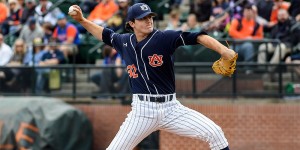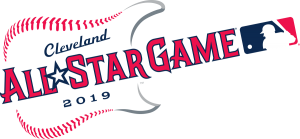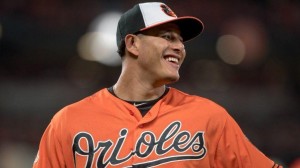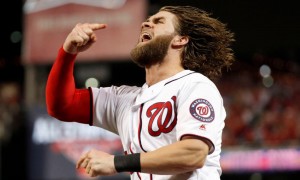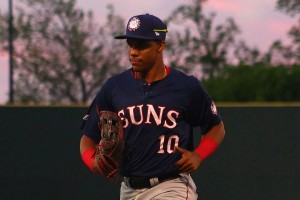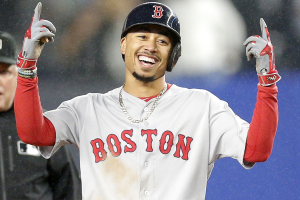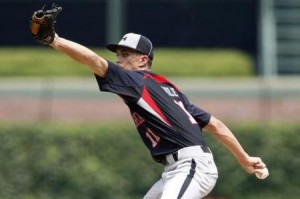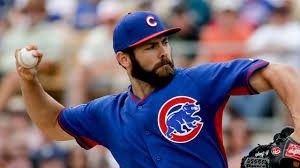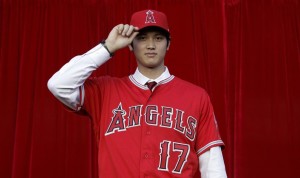The powers that be in baseball have long rung the bell of anti-competitiveness w/r/t payroll and success. In fact, its the salient driving early topic of Michael Lewis‘s seminal book Moneyball ….
Tangent. Moneyball has its faults, don’t get me wrong. I may have gone on this rant before, but having recently re-read the book, I was reminded of these issues:
- A huge part of the Oakland A’s success in the 2002 103 win season was due to their two best hitters (Miguel Tejada and Eric Chavez) being home grown talents that pre-dated Billy Beane‘s tenure as GM. Tejada was an IFA signed in 1993, Chavez drafted out of HS as the 10th overall pick in 1996. Beane did not ascend to the job til 1997.
- An even huger part of the A’s success was due to their rotation; three Ace-level arms under the age of 26 that season in Tim Hudson, Barry Zito and Mark Mulder, none of which was paid more than $875k that year as pre-arb guys … and in fact Zito wasn’t even to arbitration yet. Combined bWAR for these three: 15.8.
- The much-ballyhood 2002 draft, which is the subject of most of the book and is the center of the movie’s conflict? The one where the A’s had 7 first round or supp-1st round picks? It was an abject failure. Of the 7 guys they drafted in the 2002 1st round, 3 never made the majors and a 4th (the much-argued-about Alabama C Jeremy Brown) had a MLB career that consisted of 5 games. A 5th player (Mark Teahen) had a combined career MLB bWAR of 2.6. The remaining two players (Nick Swisher and Joe Blanton) had long careers of course … but Blanton had just 11.8 career bWAR across 262 games in 13 years, finishing his career with none other than the Washington Nationals and never once making an all-start team or gaining a single Cy Young vote: career ERA+? 95. I’m sorry, but good drafting teams hit on their first rounders more often than not and the “bar” is MLB regular. They got perhaps 1 and a half out of 7 picks right in this year, for all of the
- That whole guitar-playing daughter movie BS? Non-existent in the book. Hey I get it; you gotta make Brad Pitt look likeable. By all accounts in the book, Beane is … not likeable. There were stories of him screaming in meetings, throwing furniture in the draft room, being incapable of watching the games with others because he got so worked up … to say nothing of his exploits as a professional hitter self-destructing in rage. Pretty sure these behaviors wouldn’t fly in today’s climate.
I digress.
As pointed in Moneyball … during MLB’s investigation a pesky economist kept asking questions like, “If there’s a direct correlation between payroll and success, then how does Oakland keep winning with these low payrolls?” And nobody had a good answer. It got me thinking, in the wake of Washington’s well-funded World Series victory in 2019, what exactly was the history of payrolls to WS wins. Well, here it is in tabular format.
| Year | team | payroll | high | low | median | payroll rank | notes |
|---|---|---|---|---|---|---|---|
| 2019 | Washington | 197 | 236 | 60 | 126 | 4 | |
| 2018 | Boston | 233 | 233 | 65 | 134 | 1 | 33m more than #2 |
| 2017 | Houston | 124m | 241 | 63 | 139 | 17 | Result of bottoming out strategy in 2013 |
| 2016 | Chicago Cubs | 171m | 250 | 63 | 131 | 6 | |
| 2015 | Kansas City | 112m | 282 | 69 | 118 | 17 | LA = 282; just crazy |
| 2014 | San Francisco | 149m | 236 | 45 | 107 | 7 | |
| 2013 | Boston | 150m | 229 | 26 | 93 | 4 | Houston = 26m |
| 2012 | San Francisco | 131m | 213 | 51 | 94 | 6 | |
| 2011 | St. Louis | 109m | 207 | 39 | 92 | 10 | |
| 2010 | San Francisco | 97m | 212 | 37 | 84 | 11 | |
| 2009 | New York Yankees | 203m | 203 | 37 | 81 | 1 | 50M more than #2 |
| 2008 | Philadelphia | 96m | 213 | 25 | 78 | 13 | Miami = 25 |
| 2007 | Boston | 147m | 195 | 25 | 87 | 2 | |
| 2006 | St. Louis | 89m | 201 | 16 | 83 | 11 | Miami = 16 |
| 2005 | Chicago White Sox | 75m | 209 | 30 | 67 | 13 | |
| 2004 | Boston | 128m | 185 | 27 | 63 | 2 | |
| 2003 | Florida | 47m | 153 | 19 | 69 | 25 | TB = 19 |
| 2002 | Anaheim | 61m | 126 | 34 | 61 | 15 | |
| 2001 | Arizona | 85m | 111 | 23 | 64 | 8 | |
| 2000 | New York Yankees | 92m | 92 | 16 | 58 | 1 | 5m more than #2 |
| 1999 | New York Yankees | 91m | 1 | 11m more than #2 | |||
| 1998 | New York Yankees | 73m | 2 | ||||
| 1997 | Florida | 52m | 5 | ||||
| 1996 | New York Yankees | 61m | 1 | 6m more than #2 | |||
| 1995 | Atlanta | 47m | 4 |
Some thoughts looking at 2019 and going backwards:
- 17 of the 25 WS winners since divisional play started had payrolls in the top 10 of the league
- 14 of these 25 winners were top 5.
- The Los Angeles Dodgers have spent an amazing amount of money to win nothing over the past 5-6 years. They’re the “high” payroll for most of this decade, peaking at $282M in 2015.
- The Nats just won the WS with the 4th largest payroll in the game, basically at the top of the luxury tax line.
- Boston won it last year with easily the highest payroll in the game, fully $33M more than the 2nd highest payroll. Now that’s buying a title!
- Houston’s 2017 title comes on the back of them absolutely bottoming out in 2013 and having successive 110+ loss seasons, so its status as an outlier doesn’t exactly hold water.
- You have to go back to Kansas City’s 2015 run to see our first outlier … and it should be noted that Kansas City completely bottomed out their farm system to achieve those two years of success, immediately dropped to a .500 win team the year after and now have two straight 100+ loss seasons AND have by some accounts one of the worst farms in the game.
- Before that you’re in the 2010-11 time-frame, where a 90-win St.Louis team with the 11th highest payroll went on a magical run to take out a bunch of teams with better records.
- The 2008 Phillies were only the 13th ranked payroll; they were driven by career years of home-grown stars still confined by arbitration; within a couple of years Philly would be at the top of the league payroll list too.
- Clearly 2003 Florida is the huge outlier; the only team with a payroll not at least in the top half of the game to take a series. And I think we all know about that year…. i’m sure Dusty Baker and Steve Bartman remember it well.
So, does this data tell us anything? Is it correlation or causation? Or coincidence?
